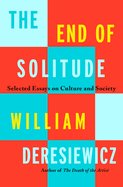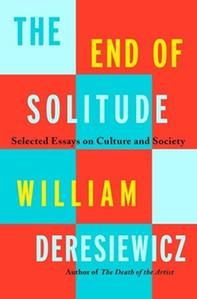
 In "On Political Correctness," a 2017 piece reprinted in the thematically wide-ranging and bottomlessly rewarding The End of Solitude: Selected Essays on Culture and Society, William Deresiewicz calls himself "an atheist, a social democrat, a native Northeasterner, a person who believes that colleges should not have sports teams in the first place, and, in case it isn't obvious by now, a card-carrying member of the liberal elite." But woe betide readers who think they have Deresiewicz pegged.
In "On Political Correctness," a 2017 piece reprinted in the thematically wide-ranging and bottomlessly rewarding The End of Solitude: Selected Essays on Culture and Society, William Deresiewicz calls himself "an atheist, a social democrat, a native Northeasterner, a person who believes that colleges should not have sports teams in the first place, and, in case it isn't obvious by now, a card-carrying member of the liberal elite." But woe betide readers who think they have Deresiewicz pegged.
He may be a liberal, but Deresiewicz (Excellent Sheep; The Death of the Artist) thinks highly enough of conservative commentator David Brooks to reproduce his ideas in The End of Solitude. Deresiewicz may be of the left, but he doesn't dismiss right-leaning thinking out of hand: "If you want to find the counterculture on today's elite college campuses," he writes in "On Political Correctness," "you need to look for the conservative students." Deresiewicz may live in artisanal-this, organic-that Portland, Ore., but he has a quibble with foodie vogue: "What has happened, in retrospect, is not that food has led to art, but that it has replaced it," he writes in "Food, Food Culture, Culture." "Nobody cares if you know about Mozart or Leonardo anymore, but you had better be prepared to discuss the difference between ganache and couverture." And Deresiewicz may be a multiple-degreed product of the Ivy League, but academia gets quite a shellacking in "The Disadvantages of an Elite Education." (Sample barbs: "The final and most damning disadvantage of an elite education: that it is profoundly anti-intellectual.... We are slouching, even at elite schools, toward a glorified form of vocational training.") It's enough to make a person consider leaving academia--which Deresiewicz did, although the decision wasn't entirely his; see "Why I Left Academia (Since You're Wondering)."
Deresiewicz's amiable skepticism and not-quite contrarianism aren't so all-consuming that he can't stomach writing the odd homage. In The End of Solitude, which comprises 42 essays, dating back to 1993 and most of them previously published, he offers encomiums to two Cunninghams--Bill and Merce--and tributes to two critics named Harold: Rosenberg and Bloom. Deresiewicz also turns the lens on himself, most revealingly in the book's newest essay, 2022's "Birthrights." It's a piquant reflection on his decision to abandon Judaism for atheism that nimbly slips into a case for assimilation--and yes, Deresiewicz knows that assimilation has fallen out of favor. --Nell Beram, author and freelance writer
Shelf Talker: These 42 thematically wide-ranging and bottomlessly rewarding essays demonstrate the author's amiable skepticism and not-quite contrarianism.

